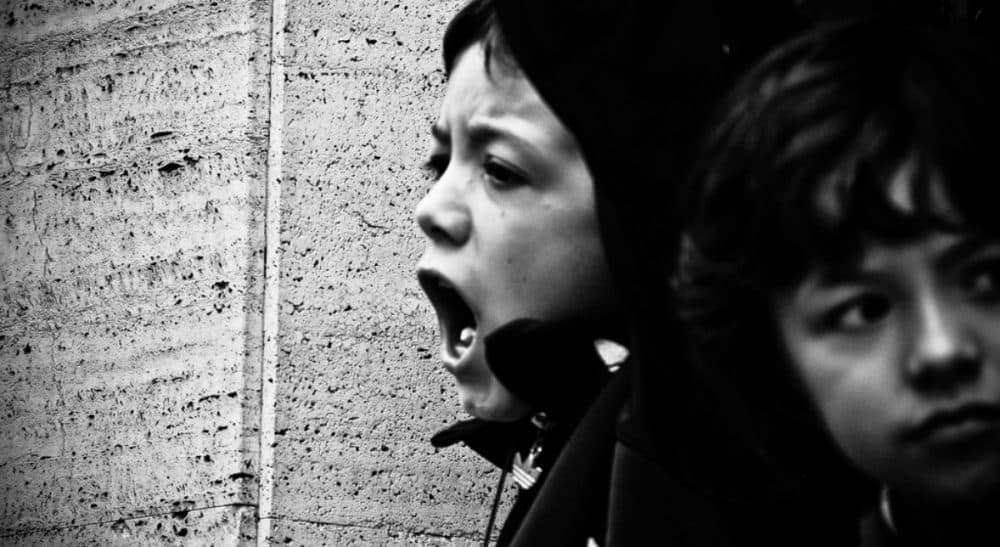Advertisement
Is Your Child's Bad Attitude A Predictor Of Terrorism? A New Federal Pilot Program In Boston Wants To Know

Can you imagine if your children’s teachers, your clergy, your health professionals and other social service providers might secretly be “rating” you and your family in order to file secret reports to the Department of Homeland Security?
That scary scenario may soon become reality in Boston, which has been named as a pilot city for a federal program called “countering violent extremism” — or CVE. Of course, most of us want to prevent violence of all kinds. But it is important to question the details of a program that would call for reporting on others like this.
Last April, Homeland Security advisor Lisa Monaco announced that a CVE local envoy would be based in Boston. More recently, the Department of Justice announced its own pilot programs would be launched in Boston, Los Angeles and Minneapolis. And this week, the White House is hosting an international summit featuring Boston as a testing ground for planned federal CVE programs.
Let’s agree: our justice system should be designed to deter attacks and to seek justice for the victims of violence, including state-inflicted violence. But experts who have studied the CVE approach say it won’t decrease violence or keep us safe.
Unfortunately, most information about the Boston initiatives is secret. But what information is available is alarming. Troubling answers are contained in a document made public recently by the Intercept, notably, an unclassified CVE “Guide for Practitioners and Analysts” issued just last year.
it is important to question the details of a program that would call for reporting on others like this.
The document lauds a number of comparative CVE models in other countries, including in Saudi Arabia, a country hardly known for its respect for civil liberties and the rights of religious minorities. The guide then offers an instrument for use by police, educators, health professionals and other social service providers, empowering them to “rate” you, your family and your community on a range of factors — such as “parent-child bonding” and “perceived economic stress.”
Without any evidence to connect such ratings to “violent extremism,” this non-scientific rating system then encourages these police officers, educators and other state actors to identify possible targets for “intervention” by the government and other agencies.
Who among us would be comfortable having educators, local police or doctors rating our families based on their perceptions and then proposing “interventions” based on our or our children’s potential to “radicalize”? Any parent who has ever had a teenager should shudder at a program that empowers others to report their children’s rebellious, argumentative comments or brooding behavior to law enforcement.
The reality, of course, is that, at least initially, many of us will not face this invasive scrutiny because we’re less likely to be targets of public anxiety about our susceptibility to “violent extremism.” In practice — and despite lip service given to targeting political violence generally — CVE programs both abroad and domestically focus on Muslims.
The U.K.’s “Preventing Violent Extremism” — or “Prevent” — program launched in 2007 is infamous for a range of abuses inflicted on the Muslim population. A lack of transparency, heavy focus on gathering intelligence on Muslims, violation of confidentiality expectations in the health sector, and the policing of radical dissent have been just a few of the outcomes of that program. Furthermore, it has actually reduced youth confidence in democracy.
The architects of the “Montgomery County Model” of CVE, in Maryland, similarly, have cited with approval imams’ willingness to conduct “theological interventions.” It’s hard to imagine the program also calling on local Catholic priests to implement such “theological interventions” at the request of law enforcement officers who view individuals as vulnerable to “radicalization,” in order to prevent violent attacks on abortion providers.
the evidence shows that CVE does not keep us safe.
As the Brennan Center for Justice at New York University School of Law has reported, law enforcement agencies in the U.S. also have an unfortunate record of using outreach programs to Muslim communities for surveillance, intelligence gathering and identification of those they label vulnerable to radicalization.
And let’s not forget then-Governor Mitt Romney’s ill-fated 2005 proposal to wiretap local mosques because, he said, “they may be teaching doctrines of hate and terror."
Given the invasiveness of the CVE approach, you’d think there must be strong evidence for its effectiveness as a public safety strategy. Instead, the evidence shows that CVE does not keep us safe. That’s because its framework is based on empirically discredited theories that certain indicators increase one’s “vulnerability” to “violent extremism.”
Law enforcement already has extraordinary power to prosecute terrorists as criminals, including the power to prosecute inchoate crimes such as conspiracy. Indeed, according to human rights experts, government agents have manufactured an astounding number of attempted terrorist plots that likely never would have happened without federal law enforcement financing and pressure — bordering on or crossing into entrapment.
So, here’s another test for Boston: Are we willing to sacrifice our precious liberties — and those of our children — at the altar of the total surveillance state when the methods don’t even make us safer?
Shannon Erwin co-authored this piece. Erwin is an attorney who serves on the Board of the ACLU of Massachusetts and the Muslim Justice League.